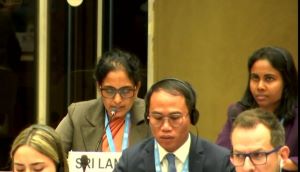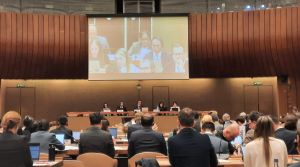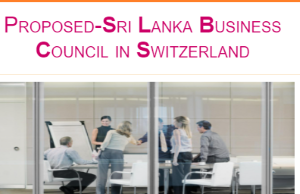

General Intervention by H.E. Himalee Arunatilaka, Ambassador and Permanent Representative of Sri Lanka to the UN in Geneva, on 28 August 2023
Mr. Chair,
Sri Lanka compliments the work accomplished by you as the Chair of this open-ended working group to date, based on the mandate given by General Assembly resolution 76/231. We are thankful to all Member States for their constructive engagement throughout the past sessions towards reaching a substantive outcome of this working group.
Mr. Chair,
Sri Lanka recognizes the common interest of humankind in the exploration and use of outer space for peaceful purposes without discrimination. Sri Lanka has been actively engaging in multilateral efforts for the prevention of an Arms Race in Outer Space (PAROS) over many decades since becoming a signatory to the Outer Space Treaty in 1967. Significantly, Sri Lanka proposed a moratorium on the testing and development of space weapons preceding multilateral negotiations on a treaty to prohibit all weapons in space in 1985.


General Intervention by H.E. Himalee Arunatilaka, Ambassador and Permanent Representative of Sri Lanka to the UN in Geneva, on 28 August 2023
Mr. Chair,
Sri Lanka compliments the work accomplished by you as the Chair of this open-ended working group to date, based on the mandate given by General Assembly resolution 76/231. We are thankful to all Member States for their constructive engagement throughout the past sessions towards reaching a substantive outcome of this working group.
Mr. Chair,
Sri Lanka recognizes the common interest of humankind in the exploration and use of outer space for peaceful purposes without discrimination. Sri Lanka has been actively engaging in multilateral efforts for the prevention of an Arms Race in Outer Space (PAROS) over many decades since becoming a signatory to the Outer Space Treaty in 1967. Significantly, Sri Lanka proposed a moratorium on the testing and development of space weapons preceding multilateral negotiations on a treaty to prohibit all weapons in space in 1985.

Dear Sir/Madam,
The Sri Lanka Consulate General in Switzerland and the Embassy of Sri Lanka in Berlin concurrently accredited to Switzerland are pleased to announce our plans to establish a Sri Lanka Business Council in Switzerland (SLBCS).
The proposed SLBCS will be a non-profit organization that will bring together Sri Lankan & Swiss businesses and individuals in Switzerland to promote trade and investment between the two countries. The Council will also provide a platform for members to network, share information, and advocate for Sri Lanka's business interests in Switzerland.
We are eager to hear from you about your interest and views of the proposed SLBCS. If you would like to be involved in the establishment of the Council, please click on the link below or scan the QR code in the flyer to complete a short survey.
https://forms.gle/Y1oSzmxzV7wEuA8X8
Your feedback will help us to determine the scope and structure of the SLBCS. We will also use your feedback to identify potential members and partners for the Council.
Intervention by Dr. Samiddhi Samarakoon, National Coordinator, Disaster Preparedness and Response Division of the Ministry of Health on National Inventory of Dangerous Pathogens (NIDP)

Thank you Mr. Chair,
I take this opportunity to brief on the background of the establishment of National Inventory of Dangerous Pathogens (NIDP) in Sri Lanka which is a key step in national implementation of the BWC. Following the Joint External Evaluation of International Health Regulations (IHR) implementation in 2017, while acknowledging the several activities that were undertaken to improve the biosafety and biosecurity in Sri Lanka, it was recommended to develop a National Inventory of Dangerous Pathogens and Toxins (NIDP) as well to further strengthen the biosafety and biosecurity in the country.
Thus, action was undertaken to develop the National Policy on Biosafety and Biosecurity, including policy statements required to satisfy the 15 Articles of the BWC; appointing two contact points including the National Coordinator, Disaster Preparedness and Response of the Ministry of Health. The Disaster Preparedness and Response Division (DPRD) of the Ministry of Health applied for extended assistance from the UNODA for implementation activities of BWC and BWC-ISU in collaboration with the National Institute of Public Health and the Environment (RVIM), of the Netherlands supported Sri Lanka to develop the NIDP. We are grateful to the Government of the Netherlands and UNODA for this assistance and the European Union (EU) for funding the project.
Intervention by Dr. Samiddhi Samarakoon, National Coordinator, Disaster Preparedness and Response Division of the Ministry of Health on National Inventory of Dangerous Pathogens (NIDP)

Thank you Mr. Chair,
I take this opportunity to brief on the background of the establishment of National Inventory of Dangerous Pathogens (NIDP) in Sri Lanka which is a key step in national implementation of the BWC. Following the Joint External Evaluation of International Health Regulations (IHR) implementation in 2017, while acknowledging the several activities that were undertaken to improve the biosafety and biosecurity in Sri Lanka, it was recommended to develop a National Inventory of Dangerous Pathogens and Toxins (NIDP) as well to further strengthen the biosafety and biosecurity in the country.
Thus, action was undertaken to develop the National Policy on Biosafety and Biosecurity, including policy statements required to satisfy the 15 Articles of the BWC; appointing two contact points including the National Coordinator, Disaster Preparedness and Response of the Ministry of Health. The Disaster Preparedness and Response Division (DPRD) of the Ministry of Health applied for extended assistance from the UNODA for implementation activities of BWC and BWC-ISU in collaboration with the National Institute of Public Health and the Environment (RVIM), of the Netherlands supported Sri Lanka to develop the NIDP. We are grateful to the Government of the Netherlands and UNODA for this assistance and the European Union (EU) for funding the project.
Intervention by Dr. Samiddhi Samarakoon, National Coordinator, Disaster Preparedness and Response Division of the Ministry of Health on the Implementation of Biological Weapons Convention Plan in Sri Lanka

Mr. Chair,
Thank you for giving me the floor. First of all, I would like to express sincere appreciation of Sri Lanka delegation for your steady stewardship of this Working Group. I also thank the ISU staff and the representatives of other international organizations for their presentations on important topics.
Sri Lanka has also been in the forefront of major initiatives in the field of disarmament and was among the very first countries to sign the BWC in 1972.
Intervention by Dr. Samiddhi Samarakoon, National Coordinator, Disaster Preparedness and Response Division of the Ministry of Health on the Implementation of Biological Weapons Convention Plan in Sri Lanka

Mr. Chair,
Thank you for giving me the floor. First of all, I would like to express sincere appreciation of Sri Lanka delegation for your steady stewardship of this Working Group. I also thank the ISU staff and the representatives of other international organizations for their presentations on important topics.
Sri Lanka has also been in the forefront of major initiatives in the field of disarmament and was among the very first countries to sign the BWC in 1972.
- Ambassador / Permanent Representative to the World Trade Organization (WTO) of Sri Lanka Presents Credentials to the Director General of the WTO
- Sri Lanka rejects the reference to Tamil Genocide Remembrance Day by the Canadian Prime Minister
- United Nations Resident Coordinator Meets President Wickremesinghe
